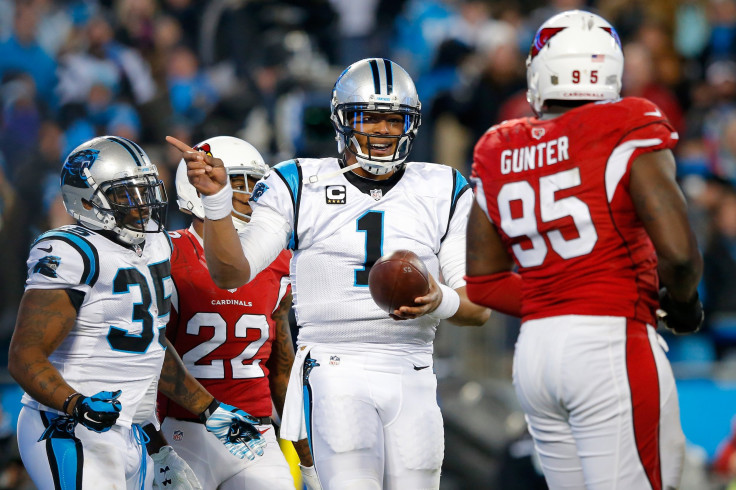Cam Newton vs. Peyton Manning: In Super Bowl 2016 Quarterback Comparison, Who Has The Edge?

Both were No. 1 overall picks who entered the NFL with nearly impossible-to-fulfill expectations, both stand 6-foot-5 and well over opposing defensive lines, and both led their teams to Super Bowl 50.
That’s about all Carolina Panthers quarterback Cam Newton and Denver Broncos quarterback Peyton Manning have in common as the two superstars prepare to tangle in Feb. 7’s championship from Levi’s Stadium in Santa Clara, California.
From there, Newton, the presumed MVP this season, and five-time MVP Manning diverge at almost any potential point of commonality, especially now that the 39-year-old Manning is in the twilight of his career after 18 seasons atop the game.
Manning appeared to shake off the nagging injuries that have plagued his 2015 season by throwing two first-half touchdowns against the New England Patriots in the AFC Championship, but based off his overall production this season compared to Newton’s, Manning must be viewed as the lesser passer in almost every way heading into the season finale.
Here’s a closer look at some of the most important traits a quarterback must have, and how Newton and Manning measure up.
Arm Strength
The 26-year-old Newton has shown far better arm strength throughout the best season of his career and even as the game progresses, while Manning’s shown far weaker range. According to NFL.com, Newton’s totaled 52 completions of 20-plus yards this year, compared to Manning’s 24. Newton’s also passed for 195 first downs, while Manning has 110.
Advantage: Newton
Accuracy
Here is where statistically the two quarterbacks are even. Each posted a 59.8 percent completion rate during the regular season, but Newton attempted 495 passes while Manning sat out six games and tossed only 331. But Newton also made the most of each attempt with 7.75 yards per pass and Manning generating 6.8 yards, the lowest of his career since his rookie season.
And even though he threw 164 more times and started seven more games, Newton only heaved 10 interceptions and Manning had 17. Also, during the playoffs Newton’s been the most accurate quarterback, completing 70 percent of his attempts, compared to Manning’s 55.1 percent.
Advantage: Newton
Leadership
This is an abstract quality that’s impossible to quantify, but it could be considered a wash. Guiding Carolina to 14 straight victories to start the year and a 15-1 record overall, Newton’s not only made a huge leap into his prime but even reached another stratosphere as a leader. He’s routinely spotted working on plays with teammates or celebrating with everyone who’s scored a touchdown, and even though he lost No. 1 receiver Kelvin Benjamin before the season began Newton rallied his troops and made the best out of a hodgepodge group of receivers in Ted Ginn Jr., rookie Devin Funchess, and veteran Jerricho Cotchery.
Manning’s always led by example, and his determination to return to the field has largely spilled over to the Denver defense. Defenders are often the unsung heroes of any winning team, and Manning set the tone by working past injuries and the threat of much younger quarterback Brock Osweiler permanently taking his job. As a testament to how strong a leader Manning is and how this Broncos team will follow him anywhere, every Bronco who spoke publicly about head coach Gary Kubiak’s decision to start Manning over Osweiler in the postseason said Manning gave them the best chance to win it all. And so far they’ve been right.
Advantage: Even
Scrambling
This one’s not even close. Due to his massive frame and quick feet, Newton’s the most feared quarterback outside the pocket in the league right now. He can burn or punish linebackers with his power and speed for first downs, or sweep around the defense for a dive at the pylon. And Newton even gained 636 rushing yards for 10 touchdowns this year, both his highest marks in three years.
Manning broke off one surprising and effective run for a first down in the AFC title game and tallied 11 rushing yards overall in the victory, the first time he’s netted positive rushing yardage in a playoff game since 2006 or in any other game since Week 8 in 2014.
Advantage: Newton
Decision-Making
If this was 2000, 2005, 2010, or even 2014, Manning would unquestionably hold this distinction over Newton. But it’s not. It’s 2016 and Newton is in peak condition, while Manning's body is failing him. Manning looked far more careful with the ball against New England, but in the regular season he was forcing throws and wound up with 17 interceptions, which still ranked second in the league despite missing six starts. With less zip on his passes, Manning sometimes forces passes.
Newton’s only just put every facet of his game together this season. His 10 interceptions during the regular season were the lowest of his five-year career, and that reflected well in his career-best 99.4 passer rating. Newton has matured this season, and has looked far less mistake-prone.
Advantage: Newton
Experience
Manning’s received some flack for losing two Super Bowls, most notably the interception he tossed that led to New Orleans' victory in 2009 and the way Seattle manhandled and picked him off twice in a 43-8 blowout loss. But Super Bowl 50 marks Manning’s fourth trip to the NFL’s ultimate game, the kind of experience Newton glaringly lacks.
Under the pressure of a Super Bowl, how will Newton react? He notched the third playoff victory of his career against Arizona and he’s never been this far in the postseason, a fact that could play a significant role on Feb. 7.
Advantage: Manning
© Copyright IBTimes 2024. All rights reserved.





















